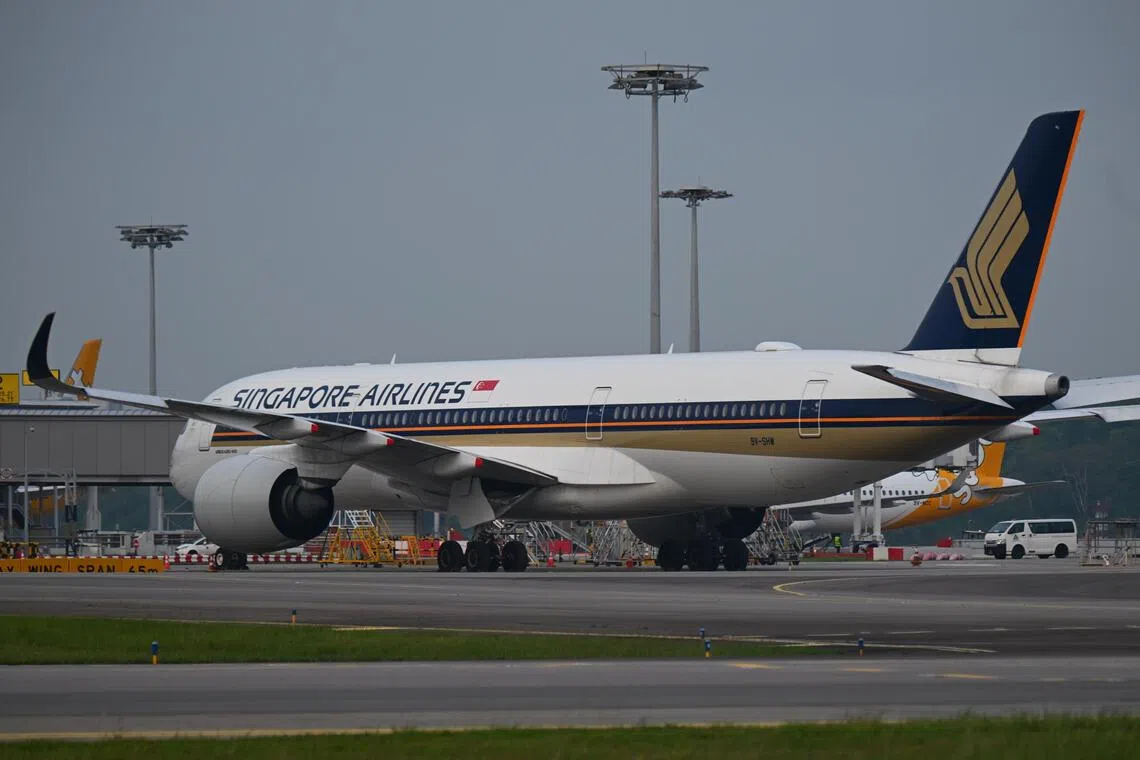Singapore Airlines announces special dividend even as earnings fall more than 67% in first half
Sign up now: Get ST's newsletters delivered to your inbox

SIA’s earnings fell 67.8 per cent year on year to $239 million in the first half of its financial year ending on Sept 30.
ST PHOTO: KUA CHEE SIONG
SINGAPORE - Singapore Airlines (SIA) Group will be paying its shareholders a special dividend over the next three financial years, even as its earnings were dragged down by losses from associate Air India, among other things.
SIA’s earnings, or net profit, fell 67.8 per cent year on year to $239 million in the first half of its financial year ending on Sept 30, due to lower interest income and its share of Air India’s losses, it said on Nov 13 in an exchange filing after market hours.
SIA began accounting for Air India’s financial performance from December 2024, after Vistara, another Indian airline, was merged into Air India. The Indian airline is also reportedly seeking financial aid from SIA after a plane crash that killed 241 people on board in June 2025.
The airline’s revenue rose in the six months to Sept 30 by 1.9 per cent from the year before, reaching a first-half record of $9.7 billion as demand for air travel continued to stay resilient despite challenges from shifting trade policies.
SIA plans to return capital to shareholders via a special dividend package of 10 cents per share annually over the next three financial years. This will amount to about $900 million over the period, reflecting the group’s strong financial position, it said.
The first interim special dividend of three cents per share will be paid on Dec 23 to shareholders as of Dec 8.
A second tranche of seven cents per share for FY2025/26 will be paid after shareholders grant their approval at the company’s annual general meeting.
“Barring unforeseen circumstances and subject to the requisite shareholder approval, the company expects to pay special dividends amounting to 10 cents per share in each of the subsequent two financial years,” SIA said.
Meanwhile, the board has also declared an interim dividend of five cents per share for the half-year that ended Sept 30. This will be paid on Dec 23 to shareholders as of Dec 8.
This brings the total dividend for the first half of FY2025/26 to eight cents per share, comprising the three-cent interim special dividend and five-cent interim dividend.
SIA noted that demand for air travel remains strong, with SIA and its budget carrier Scoot carrying 20.8 million passengers in the first half, 8 per cent more year on year.
However, passenger yields declined 2.9 per cent to 9.9 cents per revenue passenger-kilometre, driven by increased competition. Passenger yields measure the amount earned per passenger for each kilometre flown.
Revenue from SIA’s cargo arm dropped in the first half. While cargo loads grew by 1.2 per cent, it was less than capacity expansion of 2.8 per cent.
As at Sept 30, the group’s operating fleet comprised 208 passenger and freighter aircraft with an average age of seven years and eight months.
In the second quarter, SIA added three Boeing 737-8s, bringing its operating fleet to 145 passenger aircraft and seven freighters.
Scoot also took delivery of two Airbus A320neos, one Boeing 787-8, and one Embraer E190-E2, bringing its fleet to 56 passenger aircraft.
The group has 67 aircraft on order.
SIA will also increase frequencies to some destinations during the northern winter operating season from Oct 26 to March 28, 2026, to meet the higher demand for air travel during the year-end peak period. These destinations include Auckland, Busan, Da Nang, Kathmandu, Kochi, Phuket, Siem Reap, and Tokyo (Haneda).
As at Sept 30, the group’s passenger network covered 129 destinations in 37 countries and territories. SIA served 78 destinations and Scoot served 73.
The cargo network consisted of 133 destinations in 38 countries and territories, maintaining diverse global coverage.
SIA expects air travel demand to be resilient heading into the third quarter of FY2025/26, supported by the year-end peak.
“The group will remain proactive and agile, adjusting its passenger network and capacity to match evolving demand patterns and maximise revenue opportunities,” it said.
However, it noted that the air cargo segment remains uncertain amid shifting trade policies and market dynamics.
“While cargo volumes are growing on the back of the group’s diversified network and verticals, yields remain under pressure as airlines redeploy cargo capacity from the United States to other lanes,” SIA said.
It added that the airline industry continues to face challenges from geopolitical tensions, macroeconomic headwinds, inflationary cost pressures, and supply chain constraints.
But it said: “The SIA group remains well positioned to navigate this environment, supported by its strong balance sheet, disciplined cost management, robust digital capabilities and a highly talented and resilient workforce.”
It added that the group will continue to invest in service excellence, product leadership and network connectivity to strengthen its competitiveness and drive long-term, sustainable growth.
SIA shares closed down by three cents at $6.65 on Nov 13.



